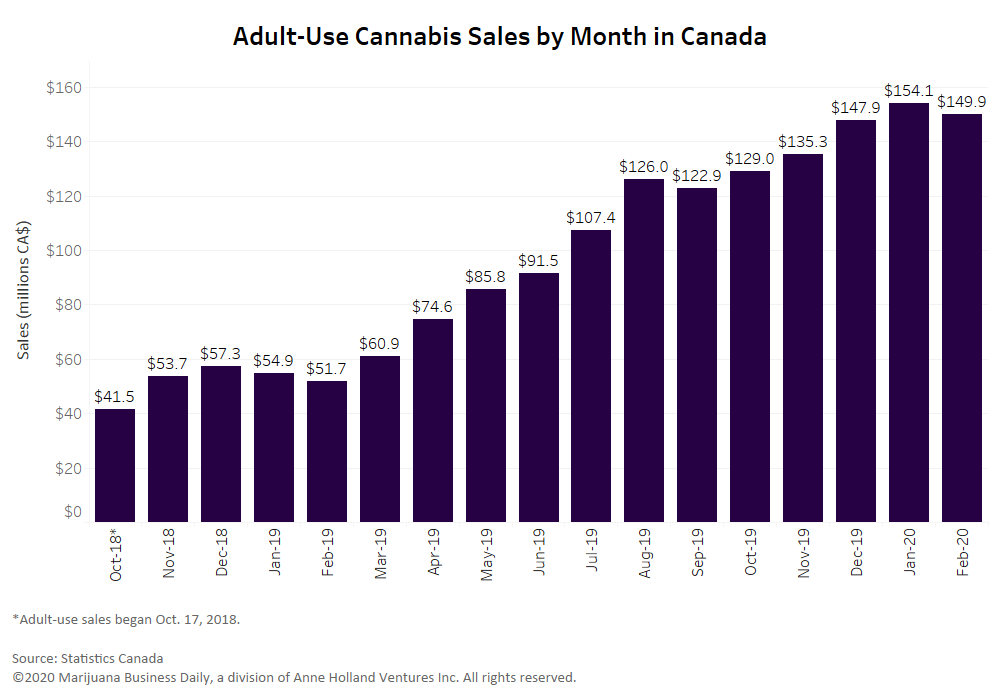Germany imported 1,032 kilograms (2,275 pounds) of medical cannabis flower for pharmacy dispensing through March 6, an amount that indicates little if any growth versus the average cannabis imported in 2019 over an equivalent amount of time.
In 2019, a total of 6,500 kilograms was imported for pharmacy dispensing, which translates into an average of 1,083 kilograms per a two-month period.
The data comes from a reply by the federal government earlier this month to a parliamentary inquiry from Germany’s Left party.
Imported quantities fluctuate significantly throughout the year, so experts warn against drawing hard conclusions from the new data.
The trajectory of the market has major implications for domestic wholesalers like Cannamedical but also for Canadian companies such as Aphria, Aurora Cannabis, Canopy Growth and Tilray that have invested heavily in cultivation assets in Europe on the expectation that a large market will develop there.
It is possible the market is slowing. But it’s just as likely that distributors were still drawing down medical marijuana inventories in early 2020 that were accumulated in 2019 and that they’ll ramp up imports later in the year.
The current coronavirus pandemic is unlikely to have caused difficulties to import.
A recent survey of pharmacies by Marijuana Business Daily found that is as widely available as it’s ever been since the start of the current program.
What this could mean
When Germany’s imports for the first two months of the year are extrapolated, less than 6,200 kilograms would be imported for all of 2020.
That would be surprisingly low for a market that has been doubling annually since 2017 because it would mean that sales in 2020 would be little changed versus 2019.
About 6,500 kilograms of flower were imported for pharmacy dispensing in 2019.
Imports reached about 3,000 kilograms in 2018, up from 1,200 kilograms in 2017.
Germany will depend exclusively on imports to supply its market at least until the end of 2020, when local production is expected to be ready.
The latest insurance reimbursement data – updated through the fourth quarter of 2019 – shows statutory health insurers covered 123 million euros ($135 million) for various medical cannabis products in the year.
The German reimbursement data does not include sales paid out of pocket by patients whose cannabis medicines are not covered by statutory health insurers.
The exact size of that market is not known because Germany does not collect and disclose that data – an anomaly the government recently acknowledged.
That means total imported quantity, which is known, remains the best measure of the German market.
But actual sales of imported products can occur in a later period, and it’s possible some products might have to be destroyed or sent back if their shelf life has expired.
MJBizDaily reported in January that a total of 6,719 kilograms of flower were imported into Germany in 2019, “primarily for pharmacy dispensing,” according to government data.
In its most recent disclosure, the government clarified its totals, saying the quantities imported in 2019 were 6,728 kilograms, of which 215 kilograms were re-exported to other countries.
The means the final quantity of imported marijuana to sell to patients in German pharmacies in 2019 was about 6,500 kilograms.
Country of origin
According to information MJBizDaily obtained from the Netherlands Office of Medical Cannabis (OMC), 2,500 kilograms of flower was imported to Germany for pharmacy dispensing in 2019. That represents almost 40% of the quantity imported by Germany to be sold to patients.
Another 500 kilograms were imported from Portugal by Cologne-based wholesaler Cannamedical.
The only other country that exported to Germany for commercial purposes in 2019 was Canada, meaning the remainder 3,500 kilograms, or 54% of total German imports, was shipped by Canadian licensed producers that had European Union-Good Manufacturing Practice-certified facilities.
As of early 2020, the German Federal Institute for Drugs and Medical Devices (BfArM) had granted only flower import authorizations to German importers to import from:
- The Netherlands.
- Canada.
- Portugal.
- Spain.
- Denmark.
The import permit can be granted only to a German company, which might be a subsidiary of a Canadian firm. But for regulatory purposes, such a company is considered a German importer.
Flower imported from the Netherlands and Canada has been available in German pharmacies since before 2019, and flower from Portugal became available for the first time toward the end of 2019.
While the first imports from Spain and Denmark were authorized by the BfArM in recent months, MJBizDaily is unaware of cannabis from those countries being already available for German patients.
The reason could be that, in addition to the BfArM import authorization, complying with other regulations and obtaining other permits – such as irradiation or others granted by regional health authorities – might be necessary before products can be delivered to pharmacies.







